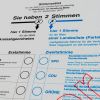Feeling the pulse of the voters
The pollster Matthias Jung explains how election prognoses come about – and why they are sometimes wrong.

Polls are not prognoses and projections are not election results. Matthias Jung, Managing Director of the Research Group on Elections, explains how demoscopy works and what he and his team have to consider before the Bundestag election.
How do we prepare ourselves for the Bundestag election? Thoroughly! That’s why we begin planning almost a year in advance. First of all, we have to review the statistical material of past elections. Then we create a random sample, for which voting districts are chosen randomly. There we question voters on Election Day who have just given their votes. These results are the basis for the six o’clock prognosis. Not the least reason the Bundestag election is a logistical challenge: a good 900 interviewers are underway on this day.
We try to protect ourselves against mistakes by with care and experience.
Still, for the Research Group on Elections, 24 September isn’t a reason to be nervous: polls, prognoses and voting analyses are our daily bread. Both during a legislative period and immediately before elections we regularly ring up about 1,250 randomly selected voters and use a detailed questionnaire to survey the political mood in Germany. This is the basis for the so-called “projection”, in which, for example, we factor in and weigh not only the party ties but also tactical considerations of those questioned. In this way we calculate what the result would be were the Bundestag election to be held next Sunday.
In accordance with the law of probability, results gained by random selection and sufficient number of respondents are looked upon as representative. We try to protect ourselves against mistakes by with care and experience. In the case of populist and extremist parties, however, we have to reckon with a high number of unreported opinions, because adherents of these parties don’t always want to reveal their attitude. This is taken into account in weighing the data. Still, the interpretation of data should be left more often to experts so that errors such as those with the Brexit vote and the American presidential elections are avoided.
Very important: polls before elections are not prognoses! They show the mood at the time of the poll, but no one can foresee future world political events. Only on Election Day itself can we talk of prognoses. Unlike polls, prognoses are based on actual votes and not mere intentions. Once the polling stations have closed, we can gradually approach the election results with projections based on official counts – and then is the time for our election analyses.
Protocol: Christina Pfänder
